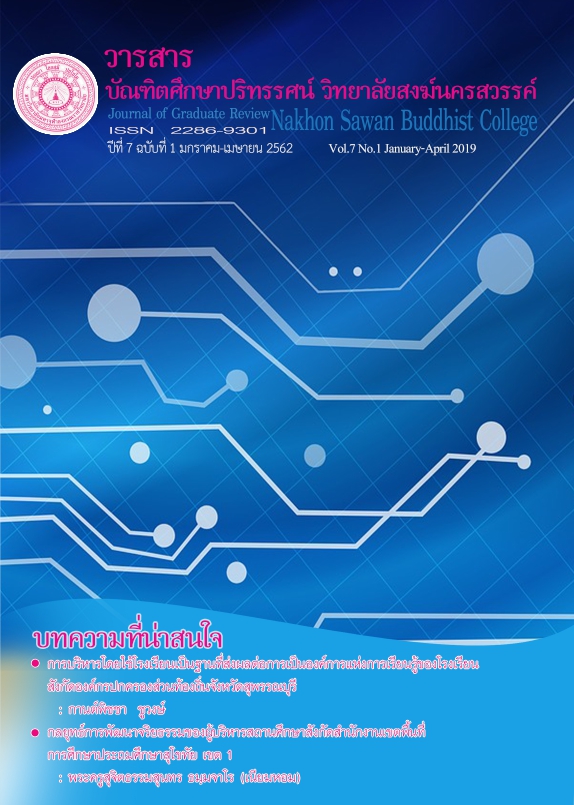Administrative management model applying trisikkha principle By Sunday Buddhist centers of the central provinces
Main Article Content
Abstract
This research study had 3 objectives: 1) to study the Management context of the Sunday Buddhism Studies Center in the centers of The central provinces; 2) to create the management model Applying Trisikkha Principle by for the Sunday Buddhism Studies Center in the centers of The central provinces; and 3) to make evaluation for the management model Applying Trisikkha Principle by of the Sunday Buddhism Studies in the centers of The central Provinces .
The study was operated into 3 steps. Step 1 was the study on the management context of the Sunday Buddhism Studies Center in the centers of The central provinces. There were 22 monks and lay as the informants. The semi-structured interviews and contextual analysis were applied. Step 2 involved the creation of the management model Applying Trisikkha Principle by of the Sunday Buddhism Studies Center in the centers of The central provinces. The informants were 9 monks and lay. The focus group was used with recorded group discussion. The contextual analysis was also used. Step 3 of the research was the evaluation on the management model Applying Trisikkha Principle by of the Sunday Buddhism Studies Center in the centers of The central provinces. The informants consisted of the Sunday Buddhism Studies Center 15 monks and lay The tool used was the evaluation on suitability in 4dimensions: Correctness, appropriateness, practicality, and utility. The statistics applied was Mean and Standard Deviation (S.D.)
The study results revealed that:
1) On the management context study of the Sunday Buddhism Studies Center in the centers of The central provinces showed there were 3 issues of management: 1) on policy and planning, they involved the environment management that promoted learning in the Center, the expectation towards learners; 2) on academic concern, it involved curriculum and teaching management, and the evaluation on learners’ progress; and 3) on staff members, it involved the Center administrators’ leadership, parents and community participation, the staff members unity, and the staff development management.
2) On the Buddhist management model Applying Trisikkha Principle by for the Sunday Buddhism Studies Center in the centers of The central provinces, it was found that: 2.1) the model of policy and planning followed the 3 Precepts, 4 Concentrations, 5 Wisdom Buddhist concepts; 2.2) the model of academic concern followed the 4 Precepts, 5 Concentrations and 3 Wisdom Buddhist concepts; 2.3) the model of staff management followed the 4 Precepts, 4 Concentration and 3 Wisdom Buddhist concepts.
3) On the evaluation of the management model Applying Trisikkha Principle by of the Buddhism Studies Center in the centers of The central provinces, it showed that all the 3 models with 4 issues had the highest values.


